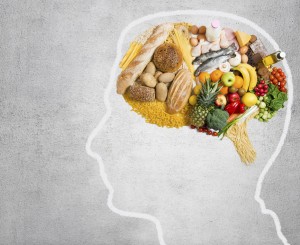
Is it really possible to “eat yourself smart”? Several studies suggest that indeed, our concentration and mental learning capacity have a lot to do with a healthy, well-balanced diet. Find out right here what you need to watch and how to get your grey cells moving….
It all starts already at Birth
By adhering to a healthy diet during pregnancy, a future mother can do quite a bit to help ensure that her child thrives in the womb. Vitamins and minerals, particularly iodine and iron, but also Omega-3 fatty acids are important for the fetus. The latter are crucial to the development of the human brain. Omega-3 fatty acids are found primarily in cold water fish (see chart below).
Brain Food – “Doping” for those little grey Cells
| Food | Benefit to the Brain |
| Banana | Decision making and thinking
|
| Broccoli
|
Is an ideal vegetable because of its high vitamin and mineral content as well as the phytochemicals. |
| Eggs, soy and milk products | Good source of lecithin
|
| Cold water fish such as herring, mackerel, salmon, cod, halibut, sardines | Optimal source of omega-3 fatty acids.
|
| Flaxseed, walnut or canola oil
|
Optimal source of omega-3 fatty acids. |
| Walnuts and other nuts | Contain valuable polyunsaturated fatty acids, vitamin E, B vitamins, lecithin as well as important minerals (magnesium, potassium and zinc) and trace elements. They help you stay mentally alert right up to old age. Increase concentration and learning ability, strengthen memory and nerve function. It is not for no reason that they are the key ingredient of trail mixes which are popular with students.
|
| Fresh salad
|
Green leaves deliver chlorophyll. It is supposed to ensure that the oxygen we breathe in stays in the brain cells longer and can therefore be used better for mental work. If the salad includes freshly cut peppers, it’ll stimulate the mind.
|
| Wheat germs | Are rich in valuable unsaturated fatty acids, vitamin E, magnesium, potassium and B vitamins. This increases concentration.
|
| Brewer’s yeast and other types of yeast | Contain high concentrations of valuable nutrients such as B vitamins and lecithin.
|
| Oats and oatmeal | Contain neurotransmitters resp. their precursors, monounsaturated and polyunsaturated fatty acids, dietary fibre, complex carbohydrates, B vitamins and zinc. Beneficial in stressful situations.
|
| 1.5 l of fluids per day | Important for an active, healthy brain. Somebody who does not drink enough can’t think clearly and can become depressed or aggressive. Particularly in older people, their thirst decreases. Low calorie or no calorie drinks such as green tea or fruit tea, mineral water, spritzers or similar, are suited best.
|
Protein components, the so-called amino acids, are also messengers resp. precursors of neurotransmitters (e.g. acetylcholine). These are responsible for the transfer of information between the nerve cellsIn order for our brain to function optimally, a continuous supply of energy is important.Complex carbohydrates are the best source. They are found in whole wheat grain products, especially in oats, but also durum pasta, whole grain rice, pasta and bread, and potatoes. As well, fruits and many vegetables such as legumes including beans or peas are good sources.What the Brain needs most of all
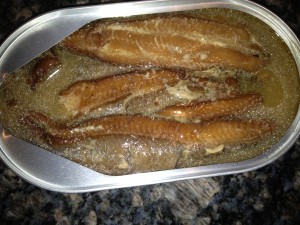
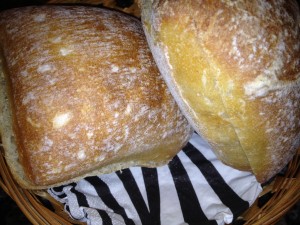
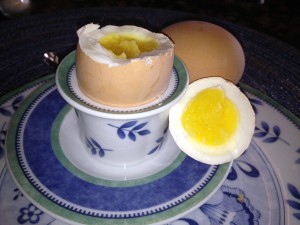
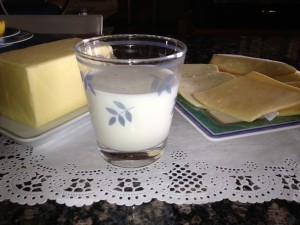
Nutrients that can jog those grey cells: Carbohydrates from whole grain products, adequate protein, omega-3 fatty acids from salmon, herring or trout, lecithin in egg yolk.

Not even the smartest brain can function without the proper nutrients
Approximately half of the brain and nervous system are made of fat. Unsaturated fatty acids as well as omega-3 fatty acids, in combination with zinc, influence the brain’s size and number of cells to a great extent. They make sure that there is good circulation in the brain.
Of course, it is understood that adequate amounts of vitamins and minerals are necessary for brain power. We do have enough, generally. Also, elements such as lecithin and phytochemicals are needed. And last but not least, it is important to drink enough so that you can think the best you can.
Fit for the whole Day with Brain Food
In the morning
When you first wake up, it is particularly the carbohydrate reserves of your brain that are depleted. Your first meal should replenish this “battery”. After that, even short-term memory is improved.
The ideal breakfast preferably starts with a muesli made from grains (oats are the best), fruit and skim milk or skim milk joghurt. Also whole grain bread with low fat cheese, fresh cheese or lean ham, with fresh fruit is ideal. Eaten together, milk products offer a good supply of calcium, while fresh fruit contributes valuable vitamins.

Muesli – the ideal breakfast for the brain
Mid-morning snack
In the morning (and the same goes for an afternoon snack) you can increase your peak performance capacity. Long breaks between meals can make you nervous, inattentive and irritable. To stay alert in between, have some spoonfuls of low fat joghurt or fresh cheese such as cottage cheese, and fresh fruit like an apple or a banana. Another ideal brain food would be a whole grain protein sandwich (with low fat cheese and lean meat). Buttermilk or whey are recommended too.
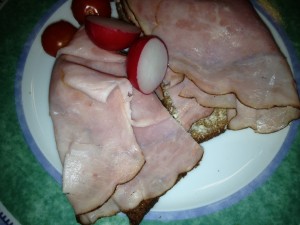
A little lean ham on a slice of whole grain bread – ideal for a mid-morning snack
Lunch
Lunch should make the brain fit for the rest of the day. If you have plans that require you to be extremely alert and concentrated, then you should enjoy a light, high-protein meal. This way, you will avoid a drop in performance, lack of concentration and overpowering fatigue. A light fish meal with a side of vegetables is ideal. Also ideal are lean meat (low fat preparation) and poultry, and vegetable dishes and raw vegetable salads as providers of complex carbohydrates. Fruit or low fat milk products are best taken for desert. Fat food, by contrast, will impair brain power.
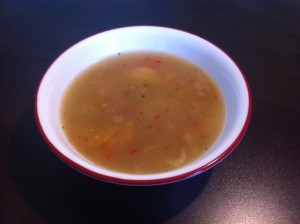
Chicken soup is a great example of a light, protein-rich lunch. It can be heated up quickly at the office
Dinner
If you don’t have to use your brain for work in the evening anymore, then it is best to give preference to carbohydrates. This way, the biochemical metabolism is switched to relaxation mode. Pasta and rice dishes are well suited.
But if you do still need to concentrate, then it is better to choose yet another light protein-rich meal. This will make you more alert and active.
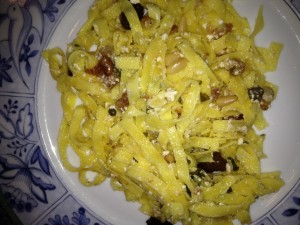
Pasta for dinner signals the brain to “relax”
An eye-opening School Experiment
With the support of the Centre for Neurosciences and Learning, of the University of Ulm, Germany, an experiment was conducted by the station Vox in light of its series on “Thirst for Knowledge”. The question was if academic success in students would be higher if their food intake was healthier. The children taking part in this study had already been on a 100 % organic food diet from the school’s cafeteria. But for the trial, they feasted on fast food for a whole day – with the intention of undergoing a test afterwards.
This trial lasted two days: On the first day, the 30 grade six students had fast food for lunch exclusively: Burgers, Schnitzel and fries. Following this, they took a couple of tests, one concentration test and one memory test.
On the second day, the kids had an organic menu that was specially put together for them by an organic caterer who labels his food as “brain food”. The ingredients were chosen specifically for the test in order to make the students mentally alert. After eating this “brain food”, they took the same test they did the day before – of course with slightly modified questions.
The result: Fast food is not only unhealthy for children – it has a negative impact on their brain power too. Students were markedly better concentrated on day two after eating “brain food” compared with the first day. The rate of error was only approximately a third of that of the “fast food day”.
Their memory was improved too on the “brain food day”. While only around 40 percent of students with fast food in their tummies could remember and recite the terms in the quiz, on the second day it was slightly more than 60 %.
In addition, on the healthy food day, the kids were more alert and active in the afternoon classes than they had been on the first day.
Healthy Eating improves Learning Ability
The bottom line: Unhealthy food has a negative impact on the mental capabilities of children. It was quite clear: Those who eat healthy are better learners. Fast food generally lacks important nutrients such as dietary fibre which ensures regular digestion. It is missing complex carbohydrates to replenish energy reserves, and vitamins and minerals, which increase concentration.
Fast food –right from the package into the microwave – is often heavily processed and full of additives. It strains the body and the brain.
Important: Taking Breaks from Learning
Students often have to sit through school for quite some time. Breaks are there to replenish their energy reserves. A lunch sandwich made of whole wheat bread, thinly spread with fresh cheese, some low fat meat or cheese resp. a vegetarian spread, offers a good ratio between carbohydrates and protein.

Breaks are important in order to replenish energy reserves. A popular food among kids: freshly cut fruits and veggies.
Products made from oats and spelt as well as nuts support the nerves. Dried fruits are excellent sources of energy and much better suited than sugary sweets, which provide the brain with energy for the short term only. Trail mixes in general are well suited.
Snacks for an alert thinking centre: Bananas, trail mix and dried fruit

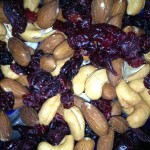
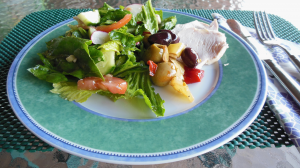
Not to forget fresh fruit and raw vegetables, which are best ready cut in bite sized pieces. For example, pieces of apple, cucumber, carrots or radishes.
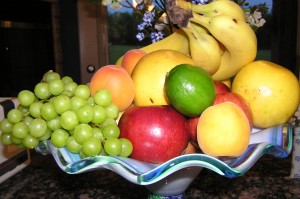
As a change from bread, you can also give them a milk product such as joghurt, fresh cheese or a milk drink.
Whole grain products ensure stable blood glucose levels. In addition, they are a source of important vitamins, minerals, dietary fibre and phytochemicals which contribute to good health. These health enhancers are found in fruits and vegetables too. Milk, cheese and other milk products are sources of calcium which are important among others for growth, resp. for the bones.
Snacks that would not be suitable to have during a break include sweet bars, croissants, donuts, etc. These would fill students with too many “empty calories”. That is, lots of energy in the form of fat and sugar, but few vitamins, minerals and dietary fibre.
Making sure that the Test goes well
Even during an exam, bananas or some trail mix will do a better job at filling up energy reserves than sugary sweets, which will increase blood glucose levels – but only for the short term. Because after that, they will drop just as fast. The result: Fatigue and problems concentrating.
For this reason, a sugar should be taken no earlier than 20 minutes before the end of the test to push forward to the end. If the test takes longer than an hour, then definitely come prepared with a drink and dried or fresh fruit.
The trail mix mentioned above is a mix of dried fruit (ideally unsulphurated!), generally raisins (other dried fruits work too) and well as unsalted nuts, usually cashews, peanuts, Brazil nuts, walnuts, pecans, macadamia nuts or hazelnuts and almonds (two kinds are completely sufficient).
Consuming these easy to digest carbohydrates, and also minerals, can have a positive effect on your mental and general achievement potential for the short term, while the iron and omega 3 fatty acids contained in the trail mix act for the longer term. Because of the fat content in the nuts and the dietary fibre in the dried fruit, sugar absorption is delayed and does not, in this combination, have the drawbacks of sweets.
Brain Food as we age
Vegetable Diet stops Mental Decline
Studies prove that older people can protect themselves against loss of mental performance by making sure they ingest sufficient omega-3 fatty acids as well as adequate amounts of vitamins and minerals. This means: Brain food is just as effective for older folks as it is for the young.
A six-year study on the elderly set out to determine whether or not fresh fruit and vegetables had a positive effect on their memory. Scientists at Rush University Medical Centre in Chicago conducted this test with approx. 3,800 people. The participants kept a diary about their food intake and underwent several memory tests. The results were astounding.
“Those who had three vegetable meals per day were able to slow their mental decline by 40 % – compared with those who did not have any vegetables at all” according to the sum-up by Dr. Martha Clare Morris, director of studies. She feels that this outcome represents a juvenescence of brain power by five years.

A study reveals: Even seniors profit from vegetables when it comes to brain power. Especially the greens are in high demand.
This positive effect was observed in particular with the leafy green vegetables, that is, spinach, kale, cabbage or Swiss chard. The study further showed that the vegetable diet benefited the memories of participants increasingly with age. It was also surprising to find that the ingestion of fruit did not influence brain power.
The bottom line: Proper nutrition can really do a lot for our thinking centre, to keep it healthy and efficient right up to old age. Additionally, this food is optimal for the whole body – it supplies us with cancer preventing ingredients and protects our cardiovascular system too.
If you have any questions about this article, homeopathy, or any other of our services, please give us a call at (519) 603-0505 and we will be happy to talk to you. Or, to book an appointment, call us or go online to www.kwhomeopathicmedicine.com.
In good health,
Irene Schwens, DHMHS, C.Tran.
Owner / Homeopath, training and expertise in
Classical Homeopathy and Live Cell Microscopy








